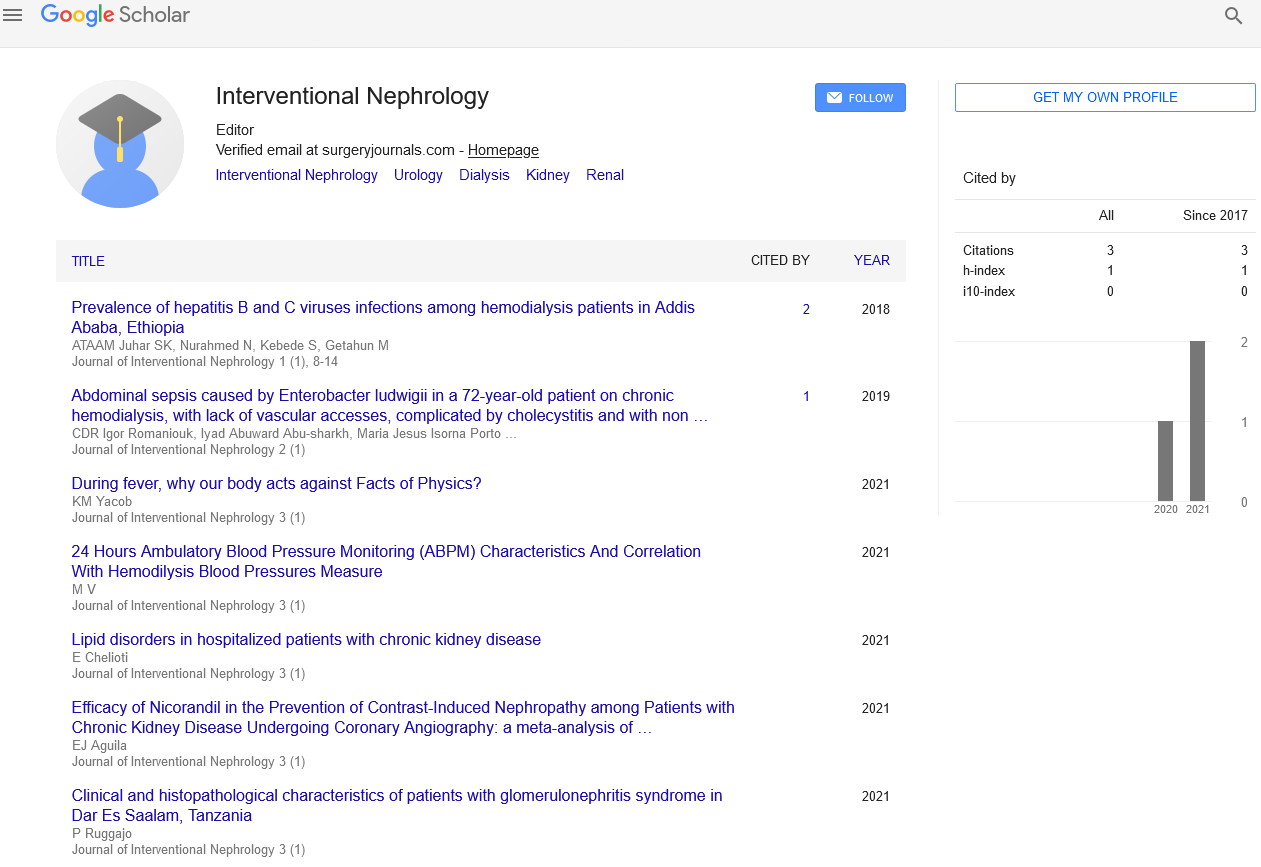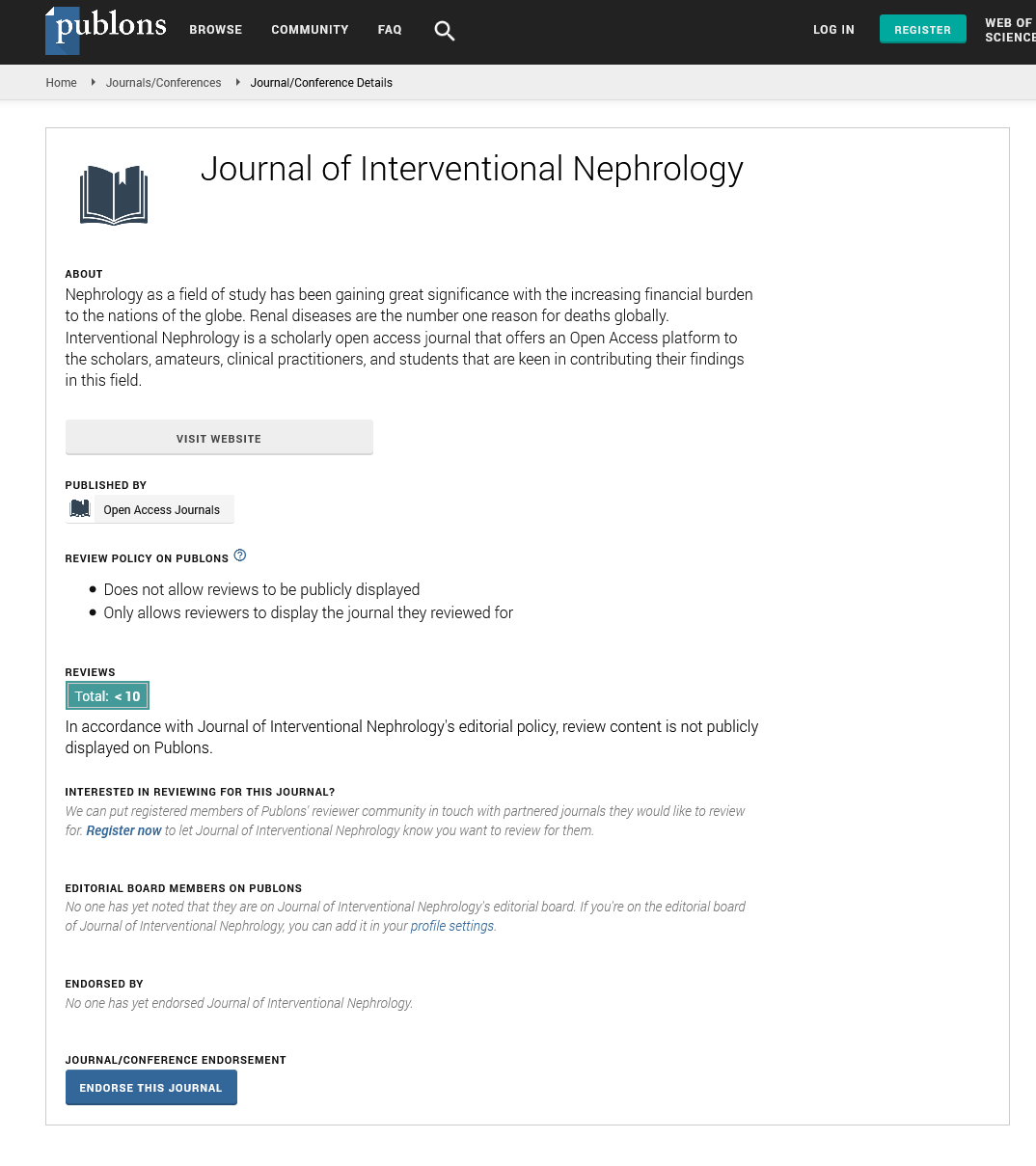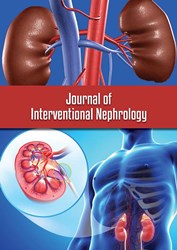Perspective - Journal of Interventional Nephrology (2024) Volume 7, Issue 6
Renal Failure Symptoms: Understanding the Warning Signs
- Corresponding Author:
- Paolo Gotloib
Department of Nephrology,
Drexel University,
Egypt
E-mail: PaoloGotloib7333wes.en@edu
Received: 20-Sep-2024, Manuscript No. OAIN-24-148464; Editor assigned: 23-Sep-2024, PreQC No. OAIN-24-148464 (PQ); Reviewed: 07-Oct-2024, QC No. OAIN-24- 148464; Revised: 01-Nov-2024, Manuscript No. OAIN-24-148464 (R); Published: 08-Nov-2024, DOI: 10.47532/oain.2024.7(6).348-350
Introduction
Renal failure, or kidney failure, is a serious medical condition characterized by the kidneys’ inability to filter waste and excess fluids from the blood effectively. This condition can be acute, developing rapidly over a short period, or chronic, progressing slowly over months or years. Recognizing the symptoms of renal failure is crucial for early diagnosis and intervention, which can significantly improve patient outcomes. This article explores the various symptoms associated with renal failure, their underlying causes, and the importance of timely medical attention.
Understanding renal failure
Types of renal failure
Acute Renal Failure (ARF): Also known as Acute Kidney Injury (AKI), this condition occurs suddenly, often due to factors like severe dehydration, trauma, or medication effects. It can sometimes be reversible if addressed promptly.
Chronic Renal Failure (CRF): This progressive loss of kidney function occurs over a long period, typically as a result of conditions such as diabetes or hypertension. Chronic renal failure may eventually lead to End-Stage Renal Disease (ESRD), necessitating dialysis or transplantation.
Importance of the kidneys
The kidneys perform several vital functions, including:
• Filtration: Removing waste products and
toxins from the blood.
• Fluid and electrolyte balance: Regulating
the balance of fluids, electrolytes, and
acids in the body.
• Blood pressure regulation: Producing
hormones that help regulate blood pressure.
• Red blood cell production: Stimulating
the production of red blood cells through
the hormone erythropoietin.
Description
Common symptoms of renal failure
Symptoms of renal failure can vary significantly depending on the severity and type of kidney dysfunction. Here are some of the most common symptoms associated with renal failure:
Fatigue and weakness
One of the earliest symptoms of renal failure is persistent fatigue and weakness. This fatigue is often due to a buildup of toxins in the bloodstream and anemia, which can occur when the kidneys fail to produce sufficient erythropoietin.
Changes in urination
• Decreased urine output: Formation
of thrombi within vascular access sites
(AV fistulas or grafts) can lead to access
dysfunction and compromise dialysis
adequacy.
• Increased urination: Conversely, some
individuals may experience polyuria, or
increased urination, particularly at night
(nocturia). This symptom is more common
in chronic renal failure, especially in the
early stages.
• Foamy or dark urine: Patients may
observe changes in urine color, such as
dark or cloudy urine, or notice that urine
appears foamy. Foamy urine can indicate
proteinuria, which is the presence of excess protein in the urine.
Swelling and edema
Fluid retention is a common symptom of renal failure, leading to swelling (edema) in various parts of the body, particularly in the legs, ankles, and around the eyes. This occurs due to the kidneys’ inability to excrete excess fluid effectively.
Shortness of breath
Shortness of breath may arise from fluid buildup in the lungs (pulmonary edema) or anemia. Patients with renal failure may find it difficult to breathe during physical activity or even at rest, significantly affecting their quality of life.
Nausea and vomiting
Gastrointestinal symptoms, including nausea and vomiting, are prevalent in individuals with renal failure. These symptoms can result from the accumulation of toxins in the bloodstream, which irritates the stomach and affects appetite.
Loss of appetite and weight loss
Patients may experience a decreased desire to eat, leading to weight loss. This is often a result of the body’s response to the buildup of waste products and metabolic changes associated with renal dysfunction.
Itching and skin changes
Renal failure can cause skin changes, including dryness, itching (pruritus), and the development of rashes. This occurs due to the accumulation of waste products in the body, which can irritate the skin.
Metallic taste and bad breath
A common complaint among patients with renal failure is a metallic taste in the mouth, along with bad breath (uremic fetor). This results from the buildup of urea and other waste products in the bloodstream.
Hypertension
High blood pressure is both a cause and a consequence of renal failure. The kidneys play a vital role in regulating blood pressure, and when they are damaged, blood pressure can rise significantly, complicating the clinical picture.
Cognitive changes
Patients with renal failure may experience cognitive difficulties, including confusion, difficulty concentrating, and decreased mental clarity. This can be attributed to the buildup of toxins affecting brain function.
Advanced symptoms in end-stage renal disease
As renal failure progresses to End-Stage Renal Disease (ESRD), symptoms can become more severe and life-threatening. These may include:
Severe edema
Fluid overload can become pronounced, leading to significant swelling throughout the body and potential complications such as heart failure.
Severe anemia
Advanced renal failure often results in severe anemia due to a lack of erythropoietin, leading to increased fatigue, weakness, and a reduced capacity for physical activity.
Bone and joint pain
Kidney failure can lead to imbalances in calcium and phosphate levels, contributing to bone pain and increased risk of fractures.
Acidosis
Metabolic acidosis occurs when the kidneys cannot adequately excrete acids. Symptoms can include rapid breathing, confusion, and lethargy.
Seizures and coma
In severe cases, the accumulation of toxins and imbalances in electrolytes can lead to neurological symptoms such as seizures and, in extreme cases, coma.
Diagnosis of renal failure
Medical history and physical examination
Healthcare providers will begin with a thorough medical history and physical examination, assessing for symptoms and risk factors associated with renal failure.
Laboratory tests
Key laboratory tests used to diagnose renal failure include:
• Serum creatinine: Elevated levels indicate
impaired kidney function.
• Blood Urea Nitrogen (BUN): Increased
levels can also suggest kidney dysfunction.
• Electrolyte panel: Measures levels of sodium,
potassium, calcium, and phosphate to assess
for imbalances.
• Urinalysis: Examines urine for abnormalities
such as protein, blood, or glucose.
Imaging studies
Imaging studies, such as ultrasound or CT scans, may be performed to assess kidney size, structure, and any obstructions that could contribute to renal failure.
Diagnosis of renal failure
Addressing underlying causes
Effective management of renal failure begins with addressing the underlying causes, such as controlling diabetes, managing hypertension, or discontinuing nephrotoxic medications.
Medications
Patients may be prescribed medications to manage symptoms and complications of renal failure, including:
• Antihypertensives: To control high blood
pressure.
• Erythropoiesis-stimulating agents: To treat
anemia.
• Phosphate binders: To manage elevated
phosphate levels.
Dietary modifications
Dietary changes are crucial in managing renal failure. A renal diet typically includes:
• Sodium restriction: Limiting sodium intake
to manage blood pressure and fluid retention.
• Protein management: Adjusting protein
intake based on the stage of kidney disease.
• Fluid restriction: Limiting fluid intake to prevent overload.
Dialysis
For patients with end-stage renal disease, dialysis may be necessary. There are two main types:
• Hemodialysis: A machine filters waste from
the blood.
• Peritoneal dialysis: The lining of the
abdomen is used to filter waste from the
blood.
Kidney transplantation
In eligible patients with end-stage renal disease, kidney transplantation can provide a permanent solution, restoring kidney function and improving quality of life.
Conclusion
Recognizing the symptoms of renal failure is essential for timely diagnosis and intervention. Early detection can lead to more effective management and better health outcomes. Understanding the various symptoms, their implications, and the importance of medical intervention can empower patients to seek help early, thereby improving their quality of life. If you or someone you know is experiencing symptoms of renal failure, it is crucial to consult a healthcare professional promptly for assessment and management.
By prioritizing kidney health and awareness of renal failure symptoms, individuals can take proactive steps toward maintaining their overall well-being and addressing any potential issues before they escalate into more serious complications.


